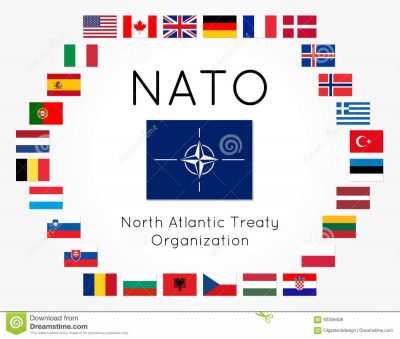
Over the summer, the tiny country of Montenegro for a brief moment became a topic of discussion in American politics. The reason was due to Montenegro’s membership in NATO. Under the terms of the alliance, members are obligated to come to the aid of any other member who is attacked…meaning by the Soviet Union now Russia. The debate was over why the United States should risk anything on behalf of this teeny-tiny country just because it was part of a mutual alliance.
Putting aside any current political issues regarding this position, the situation involving Montenegro sheds light on the early history of Israel. As it turns out, NATO provides a better template for understanding Israelite political history in the LBA/Iron I transition then does other models. Let’s look at the international context at the time when Israel first emerged in history through the lens of NATO.
EARLY ISRAEL
As is well-known, the first mention of Israel occurs in the Merneptah Stele, roughly 1206 BCE. It refers to a campaign possibly dated five years earlier. The Stele mentions Israel along with three cities in Canaan. The implication is that each one of the four is acting independently and that they are not part of a Canaanite coalition or alliance. There is no archaeological evidence to confirm or to refute that common assumption.
Merneptah was not the first Pharaoh to face rebellion in Canaan. In fact his father and grandfather both erected monuments in the same Canaanite city signifying their triumph over those who challenged Egyptian authority. What are the odds that Ramses II and Seti I identified all the Canaanite cities that had rebelled? What are the odds that in the 13th century BCE before Merneptah only Beth Shan and a few others had confronted Pharaoh? Without the equivalent of the Amarna Letters, we will never know the extent of the opposition to Egyptian hegemony.
In this regard, Israel was the new kid of the block. It had not appeared in any of the extant conquest lists by the great warriors of the 18th Dynasty who had established what scholars refer to as the New Kingdom. It had not appeared in the Amarna Letters when Pharaohs sought to maintain that empire. And it had not appeared in texts of the 19th Dynasty before Merneptah when Pharaohs repressed those who rose up against Egypt. Then Israel did appear in the Merneptah Stele.
Mernepath’s campaign against Israel seems to locate Israel in the highlands where archaeology reveals the presence of hundreds of new settlements. Contrary to the stele, Merneptah did not succeed in destroying the seed of Israel. Did that mean that Egypt simply gave up and acquiesced to the existence of anti-Egypt Israel? Did that mean that Israel would continue to stand alone against Egypt?
Who in the land of Canaan were the potential allies of Israel against Egypt and who were its enemies? Based on the archaeological evidence, Hazor was the most promising candidate for an anti-Egyptian ally. However its participation in a Canaanite Spring possibly in the wake of Ramses’s “victory” at Qadesh, undermined its ability to provide military support. Closer to Israel in the highlands and according to the biblical text, the stronghold of Gibeon appears to have been a suitable candidate to join an anti-Egyptian coalition led by Israel, the people whom Merneptah had targeted and not destroyed.
Gibeon’s potential alliance with Israel, also identifies some Canaanite cities who were loyal vassals to Pharaoh. According to the biblical text, Jerusalem initiated an alliance against Gibeon with four other cities (Josh 10:3) and therefore against Gibeon’s ally Israel. Again the absence of an equivalent of the Amarna Letters hinders any reconstruction. Those letters do show Jerusalem to be a loyal vassal and do indicate that Canaanite cities could join together against a common foe. Egyptologists have shown that Canaanite cities were capable of acting on behalf of Pharaoh even without the actual presence of Pharaoh in a campaign. It is quite reasonable to conclude that after Merneptah’s failed campaign, vassal cities in Canaan would continue the fight against the anti-Egyptian peoples and cities. I suggest that the story in Joshua 10 draws on memories of such an early confrontation between pro-Egypt Canaanite cities and anti-Egypt Israel.
SONG OF DEBORAH
By the time of Deborah, the political context had changed. When Ramses -> Sese -> Sisera III invaded Canaan in Year 8, he faced an Israelite-led NATO. Since the time of Merneptah, various non-Canaanite city peoples had formed an alliance against Egypt. These peoples are listed in the Song of Deborah (Judges 5:14-18). When called to battle, they did not all respond. Apparently one expected ally, Meroz, did not show up and was cursed (Judges 5:23).
Let’s examine this Israelite-led anti-Egypt NATO alliance further. The issues here are twofold.
1. The peoples participating in the Canaanite NATO against Egypt did not consider themselves to be Israelite. At the time of confrontation, roughly 1177 BCE, these tribes still self-identified by their tribal name and not as part of a larger political entity. There was no “Robert E. Lee” scenario where one could chose loyalty to one’s state over one’s country. The members of this alliance had not merged into being a single country with a single leader. Deborah of Israel could call the alliance into battle under the terms of the covenant they had cut, but that did not mean these tribes had become part of Merneptah’s Israel. They simply shared a common enemy.
2. One should recall that at the onset of Egyptian hegemony in the time of Thutmose III, numerous peoples had formed a coalition and fought at a battle at Megiddo. That defeat was part of the cultural memory of the Canaanites. Now, three hundred years later, perhaps this time the results would be different. As it turned out, they weren’t. The withdrawal of Egypt from the land of Canaan was still decades away until the time of Ramses VI who graciously left a statue of himself at Megiddo.
Centuries later, another coalition would arise against Assyria. From 853-845 BCE, a coalition including Israel held four times against Shalmaneser III. Then that coalition collapsed. Each member of the coalition remained independent. There was never any consideration of its members coalescing into a single political entity. One should note that a coalition had confronted Ramses II at Qadesh as well. The idea of coalition appears to have been quite acceptable before and after the Song of Deborah coalition.
The Song of Deborah frequently is regarded as one of the oldest if not the oldest text in the Hebrew Bible. It also has been the source of debate over whether it had been composed at one time or has multiple layers. (The same could be said for the Song of Miriam/of the Sea.)
Mark Smith regards the 10th century BCE as the time of transformation of a pre-monarchic oral poetry society to a monarchic prose narrative society (Poetic Heroes: Literary Commemorations of Warriors and Warrior Culture in the Early Biblical World [Grand Rapids: William B. Eerdmans, 2014], 284-307, 326-328). Specifically, he designates David as the watershed figure emblematic of the shift from the heroic poetry of early Israel to prose narratives during the monarchy.
In making this claim, Smith posits that the Song of Deborah was composed in two primary units. He dates the initial composition to the Iron I period of early Israel, to a time of various tribal militias who join or decline to participate in a coalition against a Canaanite foe [vassals of Egypt who opposed Israel]. The names Yahweh and Israel are conspicuously absent or minimized in this version. By contrast, the added component abounds in references to the two “signatories” to the covenant. Smith interprets this addition to reflect the development of the monarchical society. The emphasis had become national and not local (Smith, Poetic Heroes, 211-266, 287-289).
TRANSFORMING AN ALLIANCE TO A KINGDOM
Let’s consider the significance of the additions of Yahweh and Israel to the original version of the Song of Deborah. The participants in the Israelite-led Canaanite NATO against Egypt not only were independent entities, they did not worship the same deity. To the non-Israelite members of Canaanite NATO, Yahweh was not the victorious deity. Now he was.
Why was this change made? The answer is that someone is attempting to transform the identity of the coalition. The prominence of the deity Yahweh in the revised Song of Deborah represents an effort to redefine Canaanite NATO into a single political identity with a shared deity. By implication, that redefinition significantly includes Judah. Although the tribe and kingdom of Judah had not participated in the original battle in 1177 BCE, the deity of this Shosu/Caleb-based people and kingdom was Yahweh from the south. The revised Song not only emphasizes Yahweh, it locates him as coming from Seir. We are witnessing the effort to have non-Merneptah Israelites accept Yahweh as their deity if they did not already worship him.
The second part of the transformation is to have the members of Canaanite NATO become part of Israel. The addition to the song posits that one shared deity, Yahweh, of one people, Israel, led his people to victory over Egypt. He did so at Megiddo thereby bringing to closure the era of Egyptian hegemony initiated by Thutmose III. He did so with a water miracle and in the land of Canaan, just as he had with original Israel when he led them out of Egypt. Wilderness woman Kenite Jael had smited Pharaoh just as wilderness woman Kenite Zipporah’s people had done. The members of Canaanite NATO should become part of Israel.
One notes the existence of series of stories about membership in Israel. Dan (Judges 17-18), Gad, and Reuben (Num. 32) all have stories related to the responsibilities of membership including links to Levites and Aaronids. Caleb becomes a junior counterpart of Joshua (Num. 13:30; 14:24, 30, 38) focusing on the south (Joshua 15:13-19; Judges 1:12-20). Northern hero Gideon reaches out to Asher, Zebulun, and Naphtali (Judges 6:35), all mentioned in the Song of Deborah (Judges 5:14, 17, 18). All these stories are reflective of the process whereby Mernepath’s Israel reached out to nearby non-Canaanite city peoples to create a larger Israelite identity. The story of the Exodus was revised to include these peoples. The birth story of Israel became the birth story of anti-Egyptian peoples in the land of Canaan who had not actually departed from Egypt. In the revision of the Song of Deborah, these people were being asked not simply to be allies of Israel but to become part of Israel.
Significantly the Song of Deborah does not refer to a human king. There is no suggestion that anyone other than Yahweh should be king. He is responsible for the victory over Egypt. In political terms, the revision does not suggest that there will a human king who will do the many terrible things ascribed to a king elsewhere:
1 Samuel 8:11 …he will take your sons and appoint them to his chariots and to be his horsemen, and to run before his chariots; 12 and he will appoint for himself commanders of thousands and commanders of fifties, and some to plow his ground and to reap his harvest, and to make his implements of war and the equipment of his chariots. 13 He will take your daughters to be perfumers and cooks and bakers. 14 He will take the best of your fields and vineyards and olive orchards and give them to his servants. 15 He will take the tenth of your grain and of your vineyards and give it to his officers and to his servants. 16 He will take your menservants and maidservants, and the best of your cattle and your asses, and put them to his work. 17 He will take the tenth of your flocks, and you shall be his slaves.
As presented in the Song of Deborah, the price of membership in Israel does not these abuses of power. Actually that may not be quite true. King Solomon is remembered for doing all these terrible things, especially the forced labor. Interestingly, the claim is made that forced labor only applied to non-Israelites:
1 Kings 9:15 And this is the account of the forced labor which King Solomon levied to build the house of the LORD and his own house and the Millo and the wall of Jerusalem and Hazor and Megiddo and Gezer…17 …and Lower Bethhoron 18 and Baalath and Tamar in the wilderness, in the land of Judah, 19 and all the store-cities that Solomon had, and the cities for his chariots, and the cities for his horsemen, and whatever Solomon desired to build in Jerusalem, in Lebanon, and in all the land of his dominion. 20 All the people who were left of the Amorites, the Hittites, the Perizzites, the Hivites, and the Jebusites, who were not of the people of Israel — 21 their descendants who were left after them in the land, whom the people of Israel were unable to destroy utterly — these Solomon made a forced levy of slaves, and so they are to this day. 22 But of the people of Israel Solomon made no slaves; they were the soldiers, they were his officials, his commanders, his captains, his chariot commanders and his horsemen.
Regardless of the validity of this suspect protestation, it raises the idea of different treatment of the Israelites by choice and the residents of the kingdom by force. I suggest something similar is behind the thinking expressed in the revision of the Song of Deborah. To the allies of Israel in the Canaanite NATO against Egypt, no harm will come. The people of Dan, Gad, Reuben, Judah and the others will continue to live their lives as before except as Israelites who worship Yahweh and fight for him when called. For the Canaanite vassals of Egypt who opposed Israel from the start, this offer did not apply. Since one of the non-Israelite peoples mentioned here was the Jebusites, this proposal occurred before Jerusalem became the capital under David.
Perhaps, the revision may also have served as a warning to the peoples and cities who had been enemies of Israel for lo, these two hundred years, since Israel first appeared in the land of Canaan. Their fate would not be so pleasant.
Joshua 12:7 And these are the kings of the land whom Joshua and the people of Israel defeated on the west side of the Jordan, from Baalgad in the valley of Lebanon to Mount Halak, that rises toward Seir (and Joshua gave their land to the tribes of Israel as a possession according to their allotments, 8 in the hill country, in the lowland, in the Arabah, in the slopes, in the wilderness, and in the Negeb, the land of the Hittites, the Amorites, the Canaanites, the Perizzites, the Hivites, and the Jebusites): 9 the king of Jericho, one; the king of Ai, which is beside Bethel, one; 10 the king of Jerusalem, one; the king of Hebron, one; 11 the king of Jarmuth, one; the king of Lachish, one; 12 the king of Eglon, one; the king of Gezer, one; 13 the king of Debir, one; the king of Geder, one; 14 the king of Hormah, one; the king of Arad, one; 15 the king of Libnah, one; the king of Adullam, one; 16 the king of Makkedah, one; the king of Bethel, one; 17 the king of Tappuah, one; the king of Hepher, one; 18 the king of Aphek, one; the king of Lasharon, one; 19 the king of Madon, one; the king of Hazor, one; 20 the king of Shimronmeron, one; the king of Achshaph, one; 21 the king of Taanach, one; the king of Megiddo, one; 22 the king of Kedesh, one; the king of Jokneam in Carmel, one; 23 the king of Dor in Naphathdor, one; the king of Goiim in Galilee, one; 24 the king of Tirzah, one: in all, thirty-one kings.
In other words, there came a time, when people in the land of Canaan had a choice to make about their political allegiance. Those who had been part of Israelite-led Canaanite NATO against Egypt could worship Yahweh and become part of Israel without suffering any consequences. Those had been pro-Egypt and anti-Israel would pay the price. Evidently, someone was quite confident in his military prowess and of the opportunity to dominate the land of Canaan.
Apparently also this kingdom was to be like no other kingdom. Ishbaal’s kingdom was just another kingdom:
2 Samuel 2:9 and he [Abner] made him king over Gilead and the Ashurites and Jezreel and Ephraim and Benjamin and all Israel.
There was no vision to this kingdom, no transformation of identity to something larger than one’s blood or soil.
Last October at the National Constitution Center, John McCain said:
We live in a land made of ideals, not blood and soil. We are the custodians of those ideals at home, and their champion abroad. We have done great good in the world. That leadership has had its costs, but we have become incomparably powerful and wealthy as we did. We have a moral obligation to continue in our just cause, and we would bring more than shame on ourselves if we don’t. We will not thrive in a world where our leadership and ideals are absent. We wouldn’t deserve to.
Some of his words and idols were voiced anew at his recent funeral. Over 3000 years ago, a leader in Israel had a similar vision about how peoples of different blood and different soils could constitute themselves as a single people in a kingdom based on a covenant. That vision an effort of part of Israel’s story. The challenge in reconstructing Israelite history is in addressing the area where biblical studies are the weakest – the human element.





